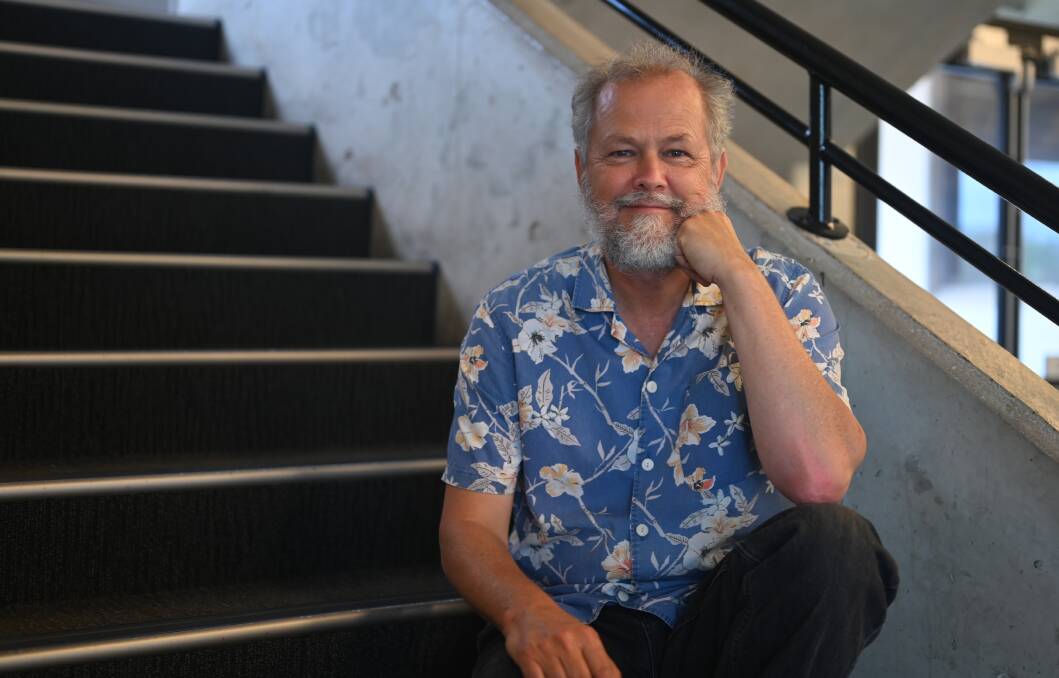
Chris Sainsbury's new work, In the beginning, fun, was commissioned for the Canberra Symphony Orchestra's 2022 Australian Series.
Subscribe now for unlimited access.
or signup to continue reading
We so often hear grand or serious music pertaining to the universe, the stars and the planets, such as John Williams' main theme for Star Wars. And at times we might hear the opposite: sublime music such as "Venus, The Bringer of Peace", from The Planets by Gustav Holst.
But what if the beginnings of the universe were simply fun? That would be a whole different scenario.
So, let's imagine a fun idea: that God was simply told by his mum to go outside and play for a while, and to make something, and perhaps that's how we got the universe! This is the cheeky yet fun approach that I take in In the beginning, fun. There are some more organic or serious sections, but it keeps coming back to fun and play.
All of the harmonic and melodic material in the work stems from three pentatonic scales a major third apart, based on C, E and Ab. This suggests symmetry. This symmetry is extended in the A section through the employment of various canon techniques, also aligned with the idea of symmetry and maths - the order in the universe.
What if the beginnings of the universe were simply fun? That would be a whole different scenario.
To interrupt the order, I introduce an element of something random by way of a "melodic comet" drifting through the main theme. This line then largely informs the B and other sections of the work, which still utilise the main A material as well, yet more organically, in a more through composed way.
I'm an Indigenous composer and have articulated my heritage in various works since the 1980s. However, this is not articulated nor evident in all of my work, for my thoughts and inspirations are many, as I believe they are for most composers.
When I articulate something of my culture and heritage in a piece, I think about it quite deeply, and write it in, my own personal expression of a culture of which I'm a part. Whilst this CSO commission isn't concerned with that, my broader work is.
Since 2016, I've taught composition full-time at the ANU School of Music. Prior to that, for 23 years, I was the Head of Department of Arts and Music at the Eora Centre for Visual and Performing Arts in South Sydney - an Aboriginal and Torres Strait Islander Tertiary College. Eora Centre graduates populate Australian film, TV, theatre, music and art scenes, including Trevor Jamieson, Trish Morton-Thomas, Elaine Russell and Nardi Simpson.
Upon arriving at the School of Music I established the Ngarra-Burria First Peoples Composers program, a platform for mentoring First Nations composers and connecting them with industry. It is also a platform for informing the classical and new music industry about how they can work better in the commissioning and programming of First Nations composers. Ngarra-Burria works in collaboration with Moogahlin Performing Arts, Ensemble Offspring, the Australian Music Centre and the Eora Centre.
Ngarra-Burria has effected an overdue and positive cultural change in the industry; we now have around 40 major music groups and festivals commissioning and programming our composers. This includes our own Canberra International Music Festival, the Canberra Symphony Orchestra, and the Griffyn Ensemble, one of Australia's leading contemporary chamber groups, as well as the Sydney Symphony Orchestra, Sydney Philharmonia Choirs, Four Winds Festival, Ensemble Offspring, The Royal Australian Navy and Airforce Bands, and more.
Two of our composers have been fellows at the Sydney Conservatorium for a year. Brenda Gifford currently holds the Peggy Glanville-Hicks Residency, Rhyan Clapham won the Peter Sculthorpe Fellowship, and I won the APRA-AMCOS Luminary Award in 2020.
In the 1980s, to my knowledge, I was the only Indigenous composer working in classical music. Then 15 to 20 years later, in the 2000s, Deborah Cheetham and William Barton moved from performance into composing too, and now we have dozens. Once, there were almost no First Nations voices in the classical and new music composition scene, and now we have a sure presence.
Canberra, your School of Music has been at the centre of that! It deserves your support in all that it does. It is as responsive and engaged as ever, even if many of the musical and cultural expressions are new to the School, such as the Ngarra-Burria program.
In addition, the School hosts the Joe Geia Yil Lull Studio, a First Nations studio run by Torres Strait Islander man Will Kepa, himself a commissioned concert music and film composer. Will and recent composition graduate Dante Clavijo have just finished engineering an album of songs by Hermannsburg (NT) songwriter/composer Warren H Williams with musicians from the CSO. Many leading First Nations musicians and local community musicians are booking into the studio. The School is a happening place!
In the beginning, fun premieres on April 7 at the National Museum of Australia, part of the CSO's Australian Series. Book at cso.org.au/stargazers or call CSO Direct on 6262 6772 (weekdays 10am - 3pm).
- Christopher Sainsbury has made a sustained contribution to Australian music since the mid-1980s. A descendent of the Dharug people (often known as the Eora or Cadigal), Sainsbury teaches composition at the Australian National University and is the founder and artistic director for the Ngarra-Burria First Peoples Composers program.

